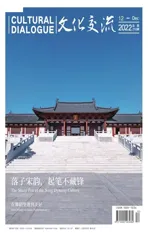从一杯茶,了解中国
——对话作家、茶人、学者王旭烽
2023-01-31文/王毓
文 /王 毓
又见西湖秋意浓,金灿灿的银杏占领了杭城的众多道路。藏在银杏背后的中国茶谣馆从容坐落着,风韵雍容。在这里,我见到了作家、茶人、学者王旭烽。
一条围巾,短发微漾着柔软的波纹,嘴角上一弯浅浅的弧线,眼神远望。与我在她众多著作勒口上看到的形象一模一样。
22年前,也是秋天的这个时候,王旭烽以“茶人三部曲”的前两部《南方有嘉木》和《不夜之侯》荣获了中国长篇小说最高奖—第五届茅盾文学奖。她以“黑马”的姿态,打破了该奖自从设立以来没有茅盾家乡浙江的作家获奖的历史。
沉潜26年,她的新作《望江南》今年和读者见面了。十个月来,已连印十六次,畅销超过二十万本。该书继承了“茶人三部曲”杭城史影和茶人精神交相辉映出的厚重史诗品格,嵌合了“三部曲”中近20年的叙事断层。由此,从1863年太平天国撤出杭州城到1998年由全世界茶人捐资修建的杭州国际和平馆揭幕,杭姓茶叶家族六代人在历史浪潮中的恒常生活落下了帷幕。中国第一部茶文化长篇史诗小说也完成了连贯的百年叙述。作家渴望搭建一个“纸上杭州”的心愿更是得以圆满。
“纸上杭州”天生锦绣
王旭烽笔下角色的生活轨迹,足以连缀杭城的文化地理。这使一些驴友把她的书当作杭州旅行秘籍。“西湖,有茶、有水、有舟,既是诗意的栖居地,也通向诗和远方。这里的生活给了我无穷无尽的创作元素。”王旭烽谈到地域对自己作品的影响时如是说。1977年,在恢复高考的第一年,她考入了杭州大学历史系。从此,就一直在西湖边求学、工作、成家。依托这里,她还创作了小说《斜阳温柔》《爱情西湖》和散文集《走读西湖》等。
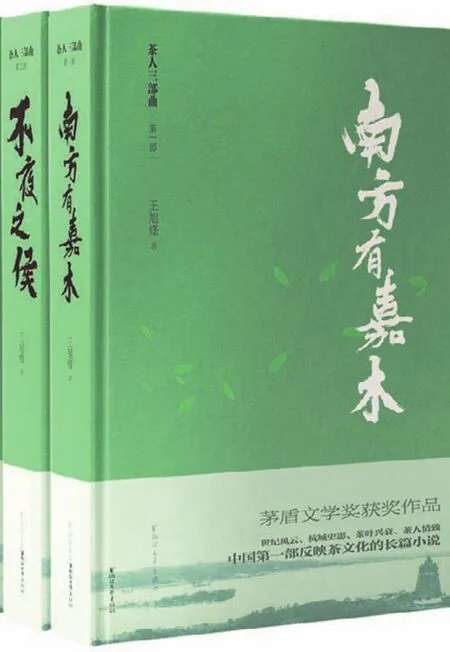
王旭烽凭借作品“茶人三部曲”荣获茅盾文学奖。Wang Xufeng won the Mao Dun Literature Prize for her “Trilogy of Tea People”.
“江南,天生就是一方锦绣山河!视觉上,一年四季我们总能看到和谐的美景,湖光山色,一树一景,莺飞蝶舞。濒临东海,西南丘陵起伏,江河湖水星罗棋布,再加上温和的气候,使这里物产丰富,山珍海味和鲜果时蔬源源不断地出现在餐桌上,做工也考究,江南人是有口福的。而且,杭州底蕴深厚,是五代吴越国和南宋王朝两代故都,并诞生了良渚文化、跨湖桥文化。”博学善谈的她递给我一本还未上架的历史随笔《吴越王》,书里谈的是吴越国三代五王绵延的家国史录。
“这里的人更是勤劳、智慧、审时度势。以西湖为例,它其实是一个人工湖,正是因为一代代人的努力积累才成就了西湖明珠。无论是洪水,还是战争,这片土地上的人没有经历过重大灾难,把文明保留了下来。江南人是温和的改革派。正是那种循序渐进的文明成就了江南。”文化是城市最高和最终的价值,而文明的生活是人们理想的生活。这也是浙江打造“诗画江南、活力浙江”的初心和目标。
“一片树叶”品饮中华文明
王旭烽一度更看重的身份是茶人,她在文章中写到,“虽然并未曾停止创作,但多年来我的心已经完全沉浸在茶之中了”。
1988年8月,杭州市园文局筹建中国茶叶博物馆,她进入茶博馆资料室工作,开始天天与茶叶、茶具、茶书、茶人打交道。“茶人三部曲”就是王旭烽进入这儿工作不久后开始写的。等到2013年重新启动写《望江南》的时候,她已经在浙江农林大学当了七年的茶文化教授。八年后,《望江南》交稿时,他们的茶学和茶文化学院真正成为二级学校。于她而言,这是双喜临门:“这是国内外唯一的茶学和茶文化学院,这是我们中华民族的瑰宝啊!”她把给学生上《茶文学通论》期间的讲义提炼揉粹,结成了《茶文化通论 :品饮中国》一书,2020年由浙江大学出版社出版。
品饮中国,茶既是物质的,又是精神的。开门七件事,柴米油盐酱醋茶;文人七件宝,琴棋书画诗酒茶。中国人会友、联谊、示礼、倡廉、表德、养性、祭祀、嫁娶、献艺、饮食等,都离不开茶。她总结说:“茶融合了中国的习俗、制度、美学和哲思,已经成为一个普适性文化元素。”她和张士康、沈才洪主编的《中国茶酒文化》一书中就详细描述了茶文化融合进中国人的宗教文化,渗透进生活体制,并和文化艺术结缘。所以,王旭烽有一个口号:“您想了解中国文化吗?就从一杯茶开始吧。”
采访当天,安吉白茶研究会一行人也来拜访王旭烽,向她请教白茶产业发展的建议。据中国茶叶生产流通协会统计,2021年,全国茶园面积4896.09万亩,茶叶产量306.32万吨。如何增值,是大家共同面临的发展问题。在浙江,还是共同富裕具体实现的问题。王旭烽回答道,文化是产业发展的根底,也是向上发展的空间,要和茶农等人的“利”字挂钩,实现“文化”“科技”“茶叶”跨界创收,让茶产品重归百姓生活的角角落落。
茶为民用,茶为民生。这不仅是建议,也是她自己正在践行的道路。中国茶谣馆不仅是竹茶文化研究所、汉语国际推广茶文化传播基地杭州站,也是浙江农林大学茶文化学院大学生教学实践基地,大学生团队在此创业。操作吧台后面的墙上,按绿茶、红茶、乌龙茶等七大茶类排列着创意茶饮和特色茶点、茶餐。这里平时还有茶艺培训、茶文化讲座和雅集。王旭烽还提出了微茶庄园概念,这是以家庭为经济单位的小规模茶庄园,集结了食宿、休闲、品饮、度假、劳作等功能,并已在桐庐瑶溪等地开馆迎客。她还趁在各地讲学之机,考察茶文化游学走读线路,计划在全国设计九条茶路。
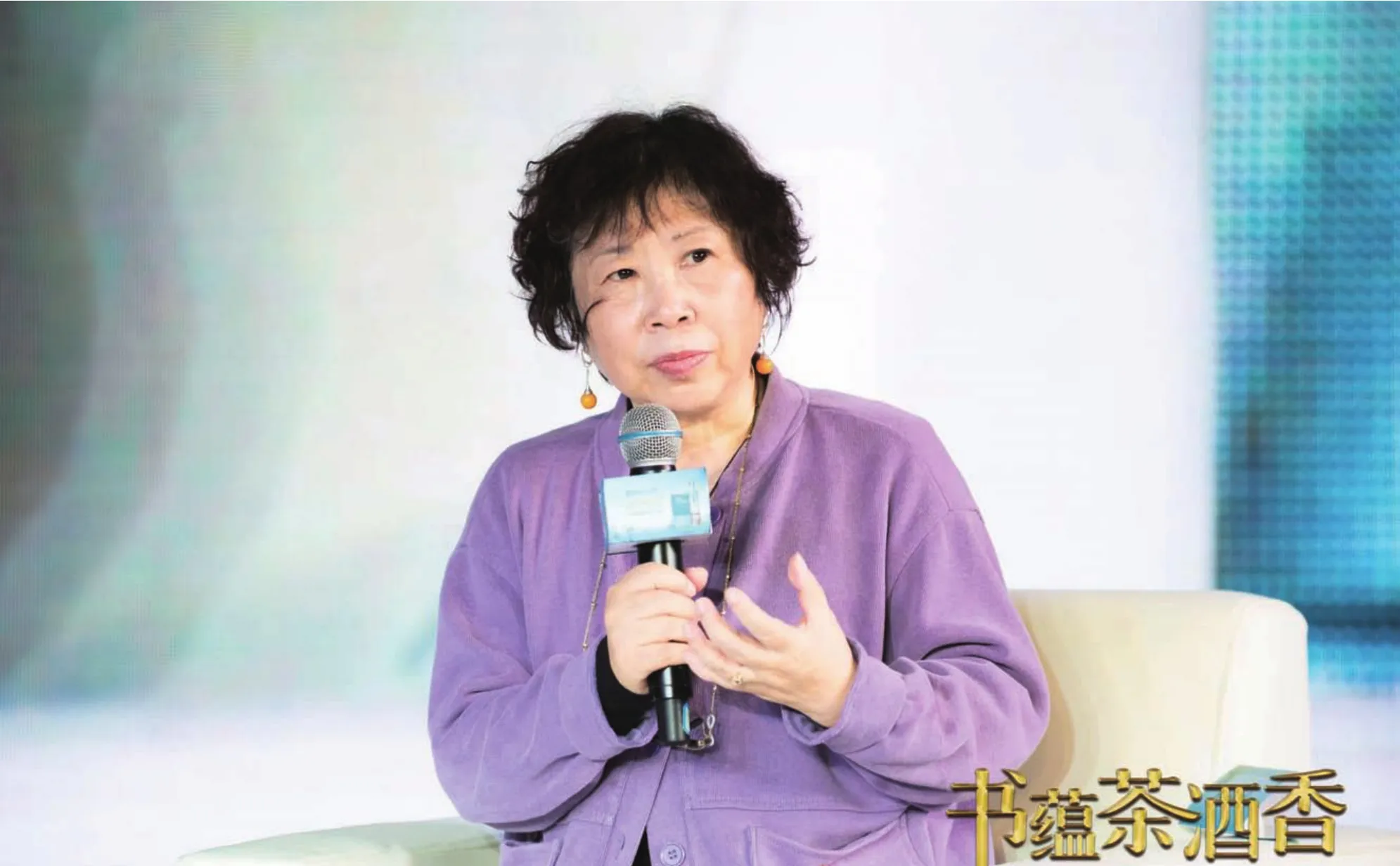
王旭烽在《中国茶酒文化》新书发布暨茶酒研讨会上发言。Wang Xufeng speaks during the launch of the book Tea and Liquor Culture in China.
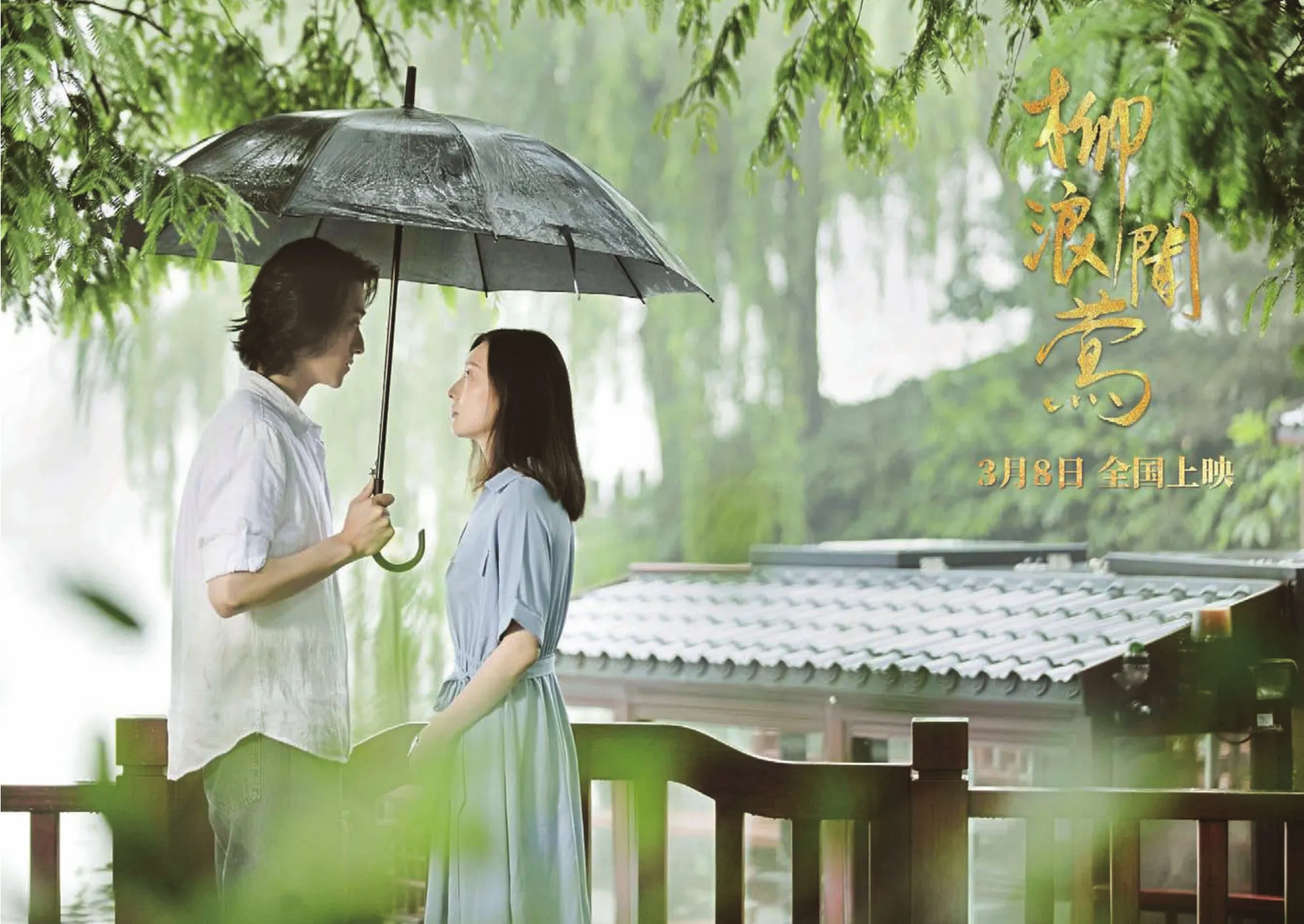
由王旭烽小说《爱情西湖》改编的电影《柳浪闻莺》上映。The Chanting Willows is a movie adapted from Wang Xufeng’s novel Love by West Lake: Ten Love Stories.
“一片树叶”走向世界
在所有作品中,王旭烽最喜欢的是由她撰稿的六集纪录片《茶,一片树叶的故事》。这是中国首部全面探寻世界茶文化的纪录片,一共拍摄了三年,走访了中国、日本、格鲁吉亚、英国、肯尼亚等八个“茶国”,翻越了三十多座著名的茶山,采访了一百二十多位茶人。云南布朗族人苏国文谨遵父亲遗嘱,将茶文化和民族历史紧密融合在一起;意大利人加博列拉·波尼诺千里来华,辗转北京、杭州,只为寻味最好的龙井;日本宫城美惠子收留残障孩子,传授他们茶道本领……这一片小嫩叶是如何从田间甘苦成为座上佳品,如何滋养一方水土,如何联络东西、沟通古今,都可以在这趟全球“茶文化”之旅中找到一份答案。
该片在央视一套播出后,广受欢迎,豆瓣评分8.7分,仅在中国年轻受众高度聚集的文化社区和视频网站B站上就有七十八万多的播放量。该片被译成英语、法语、西班牙语、阿拉伯语等多种版本,向全世界传播茶文化。2018年2月,中国将纪录片《茶,一片树叶的故事》作为国礼赠送给了当时的英国首相特雷莎。
茶有包容之心。王旭烽在解说中写到,“茶是包容的,在不同国度、不同种族、不同文化的人手中,茶,呈现了无穷无尽的可能性”。茶性也是包容的。既可以清饮,也可以调饮,是仅次于水的世界第二大饮品。茶道也是包容的,在茶叶的故乡中国,它与儒教、道教、佛教贯通,融汇了中华文明的精华:以中庸之道秉持和谐之境,以道法自然顺应养生之式,以禅茶一味通达平常之心。放眼世界,茶道在五大洲落地生根,雅俗共赏,超越了信仰、文化、民族、穷富、性别的隔阂。茶人更是包容的。王旭烽的学生指着茶谣馆墙上茶圣陆羽的挂像说:“从他开始,茶人的身边既是名儒显贵,也是普通百姓,像王旭烽老师笔下的杭嘉和一样。我们茶人嘴边常挂的一句话就是‘天下茶人是一家’!”
“家和万事兴。”疫情之前,王旭烽的脚步留在了英国、塞尔维亚等很多国家,走的路愈长愈远,愈感叹和平的珍贵。她边倒茶边说,只要一杯茶的时间,便可以凝神静气,收获平和的心情,进而减少人与人之间的冲突。茶有平和之美。“中国茶道,即以‘中和’为核心的关于茶的人文精神及相应的教化规范。”在著作《茶文化通论》中她这样说道:“茶与人类和平、茶与社会和谐、茶与人性自我之间,就如此构成深刻的本质关系。”
近年来,“茶叙外交”在G20杭州峰会、厦门金砖国家会晤等场合频频出镜。中国是茶的故乡,全球有七十多个国家引入了中国的茶籽、茶树,一百六十多个国家饮茶,喝茶的人口占全球三分之二。所以,茶不仅是中国味道,更是世界味道。2019年12月,联合国大会将5月21日定为“国际茶日”,旨在宣传推广茶产业的社会经济意义。联合国粮农组织总干事屈冬玉曾在会上说到:“赞颂茶就是赞颂和平、文化与希望。”
茶本是一片绿叶,当与人类邂逅之后,渗入生活的各个地方。茶文化中的济生、爱生、共生,象征着中国人关于生活的最高智慧,更可以作为人类命运共同体的愿景和瞻望。
我们离开前,王旭烽的几位学生站在中国茶谣馆门口,朝着天空喊出了他们的愿望:“把世界铺成一张茶席,请全人类在此共饮!”
链接:
王旭烽,第五届茅盾文学奖得主,四次获中宣部“五个一工程”奖,国家一级作家,浙江省文史馆馆员。浙江农林大学教授、茶文化学科带头人,茶学与茶文化学院名誉院长,中国国际茶文化研究会理事,汉语国际推广茶文化传播基地主任,浙江省茶文化研究会副会长。全国宣传文化系统首批“四个一批”人才,国务院特殊津贴获得者,全国五一劳动奖章获得者。1980年开始进行文学创作,迄今共发表1000多万字,作品涵盖小说、散文、戏曲、话剧、随笔等。

1.王旭烽作品《望江南》,由浙江文艺出版社出版。 2.王旭烽撰稿的纪录片《茶,一片树叶的故事》登陆央视。 3.王旭烽撰稿的央视纪录片《茶,一片树叶的故事》中的影像画面。1.Memories of Jiangnan, written by Wang Xufeng and published by Zhejiang Literature and Art Publishing House. 2.The six-part docuseries Tea: Story of the Leaf, the script of which was written by Wang Xufeng, was aired by CCTV. 3.A scene from the six-part docuseries Tea: Story of the Leaf, the script of which was written by Wang Xufeng.
Understanding China Through a Cup of Tea
By Wang Yu
The lotus flowers in the West Lake were blooming red and the golden ginkgo trees took over many roads in Hangzhou. Hidden behind the ginkgo trees was a tea house that sits gracefully, full of charm. Here, I met the writer, tea master, and scholar Wang Xufeng.
Wearing a scarf, with short hair slightly rippling with soft waves and a faint smile at the corner of her mouth, her gaze distant. She looked exactly like the image I saw on the covers of her numerous works.
Some 22 years ago, also at this time in the fall, Wang won China’s highest literary award — the 5th Mao Dun Prize for Literature — for her novellas, the first two parts of her“Trilogy of Tea People”. Emerging as a dark horse, she broke history since the establishment of the award that no writers from Zhejiang, Mao Dun’s hometown, had won.
After 26 years, her new work met with readers this year.In the past ten months, it has been printed 16 times and sold more than 200,000 copies. The book inherits the heavy epic style reflected in her “Trilogy of Tea People” and integrates the narrative discontinuity of nearly 20 years in the trilogy. After this book was published, the historical story of the six generations of the Hang family, from the withdrawal during the Taiping Heavenly Kingdom from Hangzhou city in 1863 to the opening of the Hangzhou International Peace Exhibition Hall funded by tea people worldwide in 1998, has come to an end. China’s first epic novel of tea culture has also completed a consistent hundred-year narrative. And the writer’s desire to build a “Hangzhou on paper”has also been fulfilled.
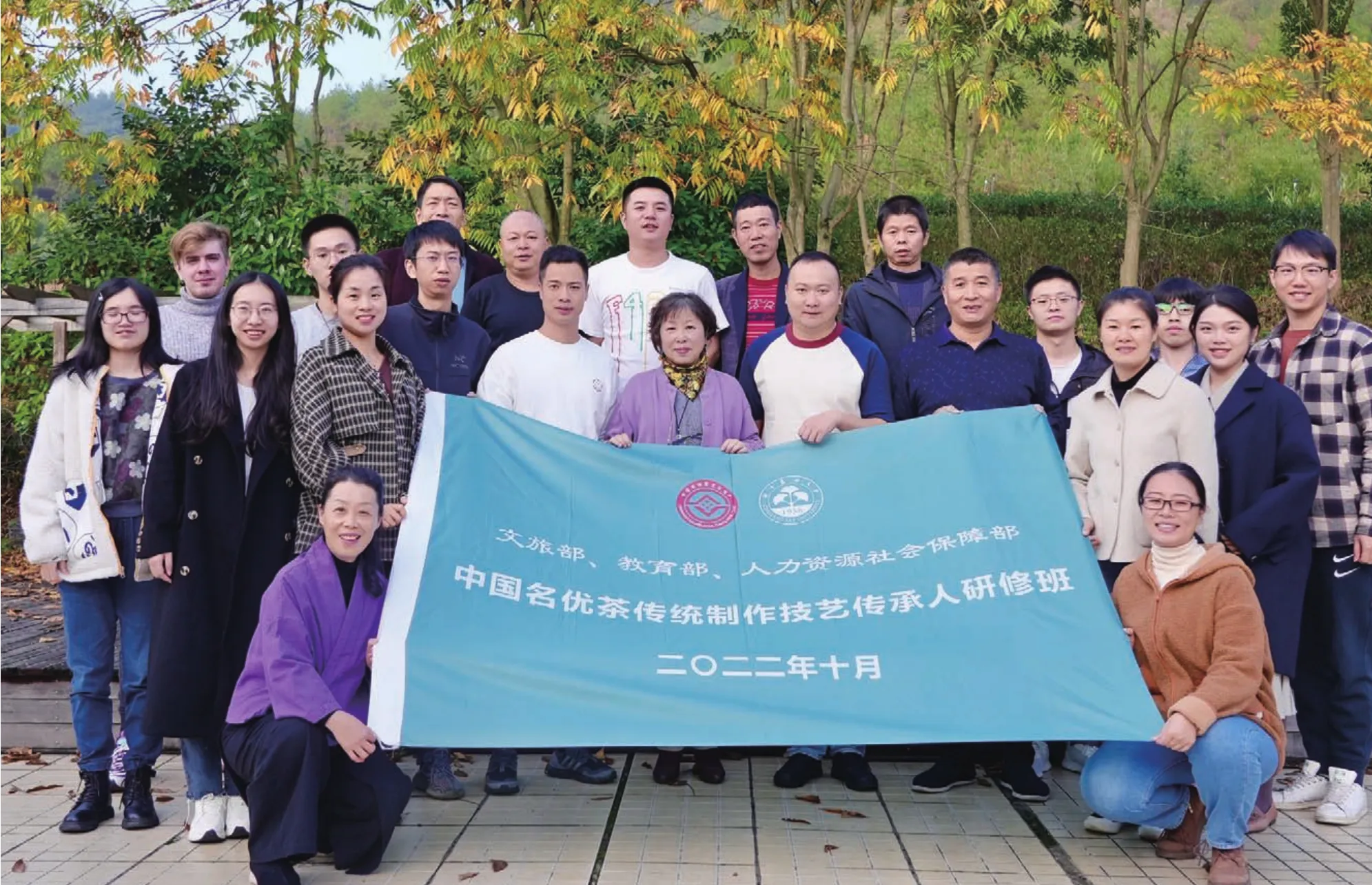
2022年10月,王旭烽为非遗传承人讲授《三茶统筹下的微茶庄园》。Wang Xufeng delivered lectures on tea culture at a workshop for inheritors of intangible cultural heritage in October 2022.
The life trajectories of the characters in Wang’s books are enough to connect the cultural geography of Hangzhou. This has led some tourists to treat her book as a secret guide to Hangzhou.
“The West Lake, with its tea, water, and boats, is a poetic habitat that also accommodates wild dreams. Life here has given me endless creative elements,” said Wang when talking about how her works have been influenced by the city of Hangzhou. In 1977, the first year of resuming the college entrance examination, she entered the history department of Hangzhou University. Since then, she has stayed here by the West Lake, studying, working and living.
“Jiangnanwas born to be such a piece of beautiful land with mountains and rivers. All year round we can always see the harmonious beauty of the landscape. Bordered by the East China Sea, and the rolling hills of the southwest, it also has a mild climate, making it a land of abundance. On the table, there are constantly seafood, meat, seasonal vegetables, and fresh fruits …very exquisitely cooked as well. Jiangnan people are a lucky group of eaters. Moreover, Hangzhou has a deep historical heritage, being the former capital of the Wuyue State of the Five Dynasties and the Southern Song dynasty for two generations, and is also home to the Liangzhu and Kuahuqiao cultures,” Wang explained.
“The people here are even more diligent, wise and flexible.Take the West Lake as an example, it is actually an artificial lake,and it is the result of generations’ collective efforts. Whether caught in floods or wars, the people of this land have never failed to preserve local civilization. Jiangnan people are mild reformers. It is that kind of step-by-step philosophy that has shaped Jiangnan into the way it is.” Culture is the highest and ultimate value of the city,and civilized life is what people are after. This is also the original intention and goal to build a “picturesque and dynamic Zhejiang”.
Wang Xufeng values her identity as a tea expert more. She once wrote in an article that “although I haven’t stopped writing,over the years my heart has been completely drenched in tea”.
In August 1988, when the then Hangzhou Garden Bureau was preparing for the establishment of the China National Tea Museum, Wang began to work at the museum’s information room, dealing with tea sets, tea books, and tea people every day. The “Trilogy of Tea People” was written shortly after she started working here. By the time she restarted writingMemories of Jiangnanin 2013, she had been a professor of tea culture at Zhejiang A&F University for seven years. Eight years later,when she finished the manuscript ofMemories of Jiangnan, the university’s College of Tea Science and Tea Culture became a secondary school. To her, this was double happiness: “This is the only college of tea science and tea culture at home and abroad,which is the treasure of our nation!” She compiled her lecture notes for the course on the general theory of tea literature into a book titled Essays of Tea Culture, which was published by Zhejiang University Press in 2020.
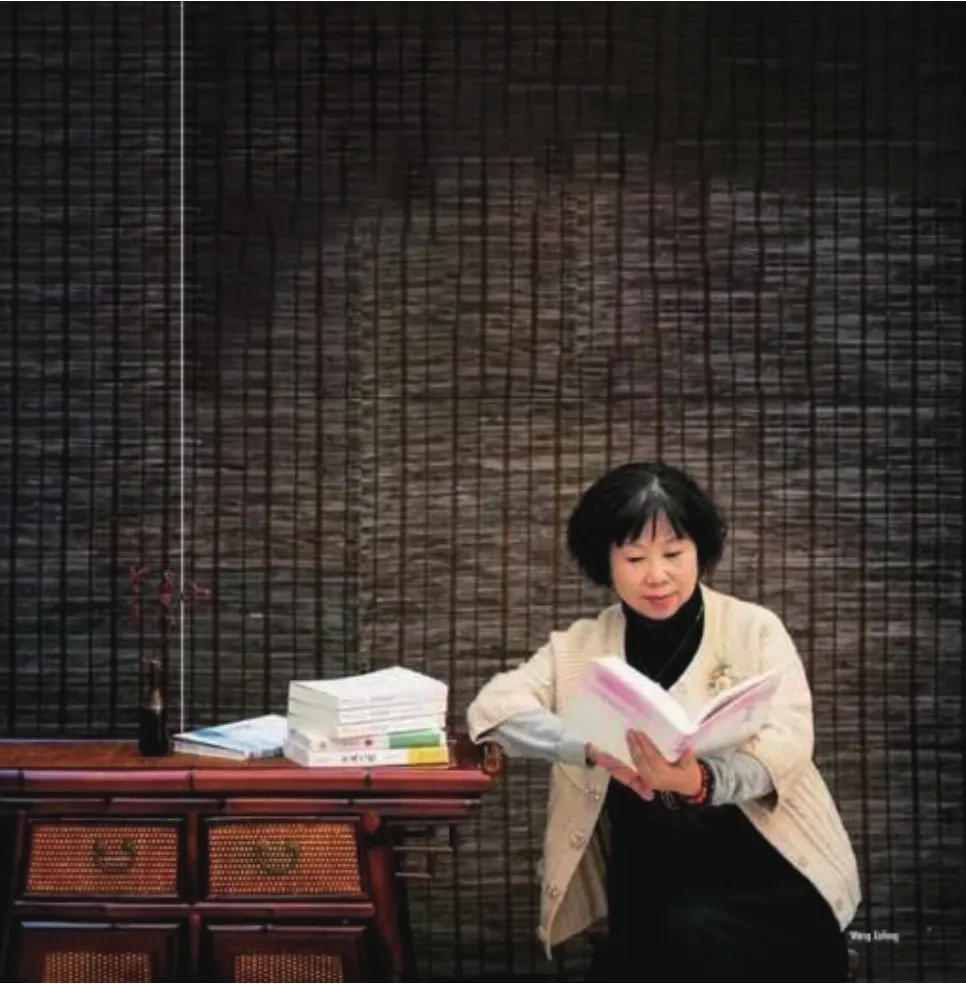
王旭烽。Wang Xufeng.
Chinese tea is both physical and spiritual. “Tea has become a universal cultural element by integrating Chinese customs,institutions, aesthetics and philosophies,” she concluded. The bookEssays of Tea Culture, edited by herself, Zhang Shikang and Shen Caihong, describes in detail how tea culture has fused into Chinese religious culture, penetrated the institutions of life, and tied up with culture and art. Therefore, Wang has come up with a slogan:“Do you want to understand Chinese culture? Just start with a cup of tea.”
“I did not drink tea, it was tea that drank me,” Wang once wrote down this sentence. She was determined to spend her life doing one thing — to spread tea culture.
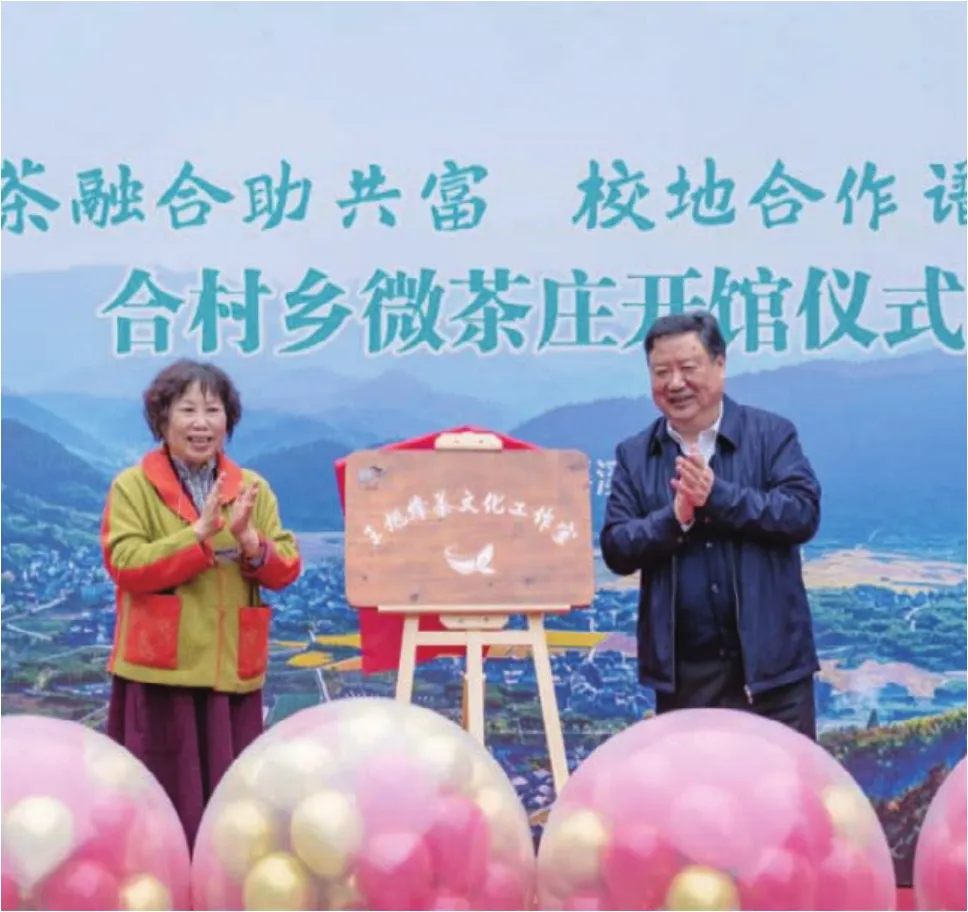
王旭烽参加微茶庄开馆仪式。Wang Xufeng attended the unveiling of a tea manor.
On the day of the interview, a group of researchers from the Anji White Tea Research Association also came to visit Wang, to ask her advice on the development of the white tea industry. According to the China Tea Production and Circulation Association, in 2021, the national tea garden area was 48,960,900mu, and the tea output was 3,063,200 tons. How to increase value is a development issue faced by everyone. In Zhejiang, it is also a specific item of common prosperity. Wang answered that culture is the foundation of industrial development and provides the space for upward development. According to her, we need to link the“benefit” of tea farmers and others to achieve cross-border creation of income from “culture”, “technology”, and “tea”, and make tea products return to every corner of people’s lives.
Tea is for the people, tea is for people’s lives. This is not only a suggestion but also a path that Wang Xufeng herself is practicing.Her tea house is not only a bamboo tea culture research institute,an International Tea Culture Base, but also a teaching and practice base for college students in the College of Tea Science and Tea Culture of Zhejiang A&F University, where college students started their own businesses. Behind the bar counter, creative tea drinks and special tea snacks, arranged according to the seven categories of tea, such as green tea, red tea, and oolong tea, are offered to guests. There are also tea art training, tea culture lectures and elegant gatherings. Wang also proposed the concept of a micro tea manor, which is a small-scale tea manor run by families as the smallest unit. It combines functions such as accommodation,leisure, tea-drinking and farm work, and has already opened in Yaoxi, Wenzhou and other places to welcome guests. She also takes the opportunity to lecture in various places to visit tea culture study routes and plans to design nine tea routes nationwide.
Among all her works, Wang’s favorite is the six-episode documentaryTea: Story of the Leaf. This docuseries shows China’s first comprehensive exploration of the world’s tea culture, with a total of three years of filming. The crew visited China, Japan,Georgia, Britain, Kenya, and other eight “tea countries”, covered over 30 famous tea mountains, and interviewed more than 120 tea people.
After its broadcast on CCTV, it was widely popular. It has also been translated in English, French, Spanish, and Arabic to spread tea culture around the world. In February 2018, this documentary was even presented to the then British Prime Minister Theresa May as a national gift.
In recent years, “tea diplomacy” has frequently appeared,including in the Hangzhou G20 summit, Xiamen BRICS meeting, and other occasions. China is the home of tea: more than 70 countries around the world have introduced Chinese tea seeds, and tea trees; people in more than 160 countries drink tea,making the tea-drinking population account for two-thirds of the world. Therefore, tea is not only a Chinese flavor, but also a world flavor. In December 2019, the United Nations General Assembly designated May 21 as “International Tea Day” to promote the socio-economic significance of the tea industry. The directorgeneral of the Food and Agriculture Organization of the United Nations (FAO), Qu Dongyu, said on the occasion: “To celebrate tea is to celebrate peace, culture and hope.”
Tea was originally a green leaf, but after meeting with humans, it has penetrated various aspects of life. The concept of rescuing, loving, and coexisting in tea culture symbolizes the highest wisdom of the Chinese people about life, and can also serve as a vision and outlook for the common destiny of humanity.Before leaving, several of Wang’s students stood at the entrance of the tea house and shouted their wish to the sky: “Spread the world into a tea mat and invite all humanity to drink together here!”
Wang Xufeng, winner of the 5th Mao Dun Literature Prize,four-time recipient of the “Five One Project” award, writer and historian at the Zhejiang Provincial Museum. She is a professor at Zhejiang A&F University, the leader of the tea culture discipline,the honorary dean of the university’s College of Tea Science and Tea Culture, the director of the China International Tea Culture Research Association, the director of the Chinese International Tea Culture Base, and the vice president of the Zhejiang Tea Culture Research Association. She is one of the first “Four Ones” talent and a recipient of special allowances from the State Council and the May Day Labor Medal. She has been engaged in literary creation since 1980 and has published more than 10 million words to date, covering novels, essays, plays, dramas, and sketches.
